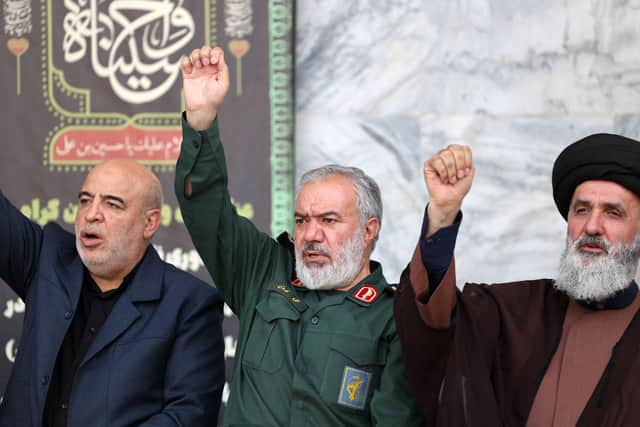IRGC: Iran’s Islamic Revolutionary Guard Corps explained - why could UK government ban paramilitary group?
and live on Freeview channel 276
The Islamic Revolution Guard Corps (IRGC) of Iran could be formally designated as a terrorist organisation by the UK government. Being a part of the group or supporting its actions would be illegal in the UK as a result of the legal change.
The proscription, were it to be made official, would come just a few years after the US reached a similar decision in 2019.
Advertisement
Hide AdAdvertisement
Hide AdAccording to Whitehall officials, no such announcement is expected imminently, and there are still many specifics to be worked out. However, they did say that reports that the government intends to proscribe the IRGC are "broadly correct."
Here is everything you need to know about it.
What does ‘proscription’ mean?
Proscription of an organisation is a formal legal procedure carried out under the Terrorism Act of 2000. Such a move makes it unlawful to be a member of the organisation in question, and also to promote its objectives, interact with its members and even display its flag or logo in public.
But it’s not quite as simple as just deciding that a certain organisation needs to be proscribed. The government must evaluate the specific threat that an organisation poses to both the UK and British nationals abroad, in addition to the scope of its terrorist activities.
Last month, Foreign Secretary James Cleverly announced that sanctions had been imposed on the IRGC. However, there is increasing parliamentary pressure on the government to take additional action.
Advertisement
Hide AdAdvertisement
Hide Ad

Why does the government want to designate the IRGC as a terrorist group?
The proscription of the IRGC would represent a further hardening of the UK’s stance towards Iran after intelligence agencies said the nation constituted a direct threat, identifying 10 plots against Britons or UK-based individuals over the previous year.
An Iranian hit squad allegedly targeted British-Iranian journalists in London last November, according to reports, and in connection with anti-government demonstrations that have been roiling Iran in recent months, the IRGC detained seven individuals last week who had ties to the UK.
The IRGC, one of the most powerful paramilitary groups in the Middle East, was founded more than 40 years ago to defend Iran’s Islamic revolution. It wields enormous military, political and economic influence, and uses its substantial financial resources to back militant organisations and allies in the region.
In November 2022, the European Union imposed sanctions on the chief of Iran’s Revolutionary Guard, the corp’s Aerospace Force and a company making drones that it said had been used by Russia in its conflict with Ukraine.
Advertisement
Hide AdAdvertisement
Hide AdRussia is accused of deploying swarms of drones built in Iran over Ukraine in order to attack power stations and other vital infrastructure; the EU says it has evidence that Iran has sold drones to Russia since the war began in February 2022.
In a statement, the EU said it was targeting Revolutionary Guard chief General Hossein Salami because the corps “supervises the development of Iran’s Unmanned Aerial Vehicle (UAV) programme as well as the transfer of UAVs abroad”.
The bloc also slapped sanctions on the Revolutionary Guard’s Aerospace Force and commanding general, saying that the Shahed-136 and Mohajer-6 drones they have allegedly supplied “are used by the Russian Federation in the war of aggression against Ukraine”.
Comment Guidelines
National World encourages reader discussion on our stories. User feedback, insights and back-and-forth exchanges add a rich layer of context to reporting. Please review our Community Guidelines before commenting.
